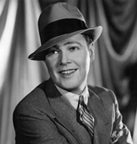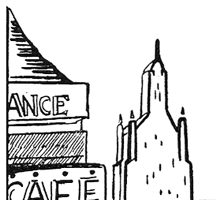 Charles Ray was a popular juvenile star in the 1910s and ’20s, but by the ’30s, his career was on the rocks, and he turned to writing. Here’s another in a series of offerings from his book, Hollywood Shorts, a collection of short stories set in Tinseltown.
Charles Ray was a popular juvenile star in the 1910s and ’20s, but by the ’30s, his career was on the rocks, and he turned to writing. Here’s another in a series of offerings from his book, Hollywood Shorts, a collection of short stories set in Tinseltown.
Mr. Howard J. Morris was a dramatist. He had three successful plays to his credit on the Gay White Way. New York had acclaimed him properly by bowing to all three. Quite an enviable position.
Talkies had taken the country by storm. The end of the silent drama had come. Writers of even insignificant offerings were grabbed for contracts by the studios on the Coast, who vied with one another for signatures. Hollywood had gone “legit,” with a battle cry: “The play’s the thing.” It was a writer’s year.
Hollywood went after Mr. Harold J. Morris. Subtly Mr. Morris went after Hollywood. They sparred frantically like pugilists. At last a mutual contract was agreed upon which thrilled Mr. Morris. He left Broadway for his first trip to Los Angeles, with a California-here-I-come attitude, and on arrival, met a welcome which warmed his heart. A major corporation had bid for and won his services. He was as happy as a bride.
But not for long. loneliness crept into his world. After he was made exceptionally comfortable in a pretentious office, no one spoke to him. He didn’t even see anyone, except when he gazed out his window onto the expanse of the studio grounds, or when he went to lunch. Often he took a stool at a counter or rudely sat at a table marked “reserved,” in the hope of finding out what might be going on in the sea of activity about him.
Now and then, on the walks between the huge stages, through sheer desperation he said “nice day” to someone—anyone. But a nod in recognition was all he received. All who ever passed him seemed to be in a frantic hurry, like ants bent on some important mission, seriously concentrating on its accomplishment. Only he went and came with nothing to do. Exasperating.
Time began to hang heavily on his hands. No assignment having been given to him, he wondered if he might have offended someone—someone they always called “big shot” cautiously, and by his first two initial respectfully. How could he find out? But after pondering deeply upon the subject, he reasoned that he could not have offended anyone if he did not see anyone to offend. An excellent hypothesis, a true deduction. Preposterous. Yes—nuts!
He exhausted the current magazines and took up solitaire. Then he reread the book of rules on bridge, got melancholy, and longed for New York.
After three weeks of loneliness, an idea flashed into his mind as to how to gain attention. After weighing the matter mentally for an hour, he decided. He went out and got what is commonly called drunk.
Three days later, with head hanging sheepishly and brain crowded with remorse, he went to an executive’s office to apologize. Humiliating.
The executive was in solemn conference, had been for some time; but the secretary advised that she would try to arrange an appointment at the earliest possible moment. However, it might be a day or two, perhaps three. She would be nice and “squeeze him in.”
A week went by.
Torn with emotions, Mr. Howard J. Morris made a final decision which calmed him somewhat. His resentment toward the firm for not giving him an assignment was bad enough, but to be ignored utterly was the last straw. He would leave it all and go where he was appreciated. He’d laugh it off on the train back to New York. If they thought “to hell with him,” then he’d think “to hell with them.” Fifty-fifty. No malice, no hard feelings. Just nuts!
Old Broadway was a cheering sight to Mr. Morris, until he swung into a telephone booth to say “cheerio” to close pals. When he found that the first three he called had recently left for Los Angeles, he relented to a quick impulse to get away from everyone and hurriedly made arrangements for passage to Europe.
A week in London was dreary to him. A week in Paris a little gayer; but no one to enjoy it with irked him. Just as he was deciding on Berlin, melancholy enveloped him. Foreign people were no more friendly than the studio group at Hollywood. Disgruntled and restless, he sailed for New York.
A heavy sea, a relieved stomach, and the calm which followed gave Mr. Morris a kindly feeling for his fellow man. With conscience as the accusing judge, he meditated not a little on his actions of the past four weeks.
Quite true, he had not severed his connections at the studio in a proper, and certainly not in a manly, manner. He had played the part of a schoolboy. Yes, it would all have to be rectified before he could have peace of mind again. It was now thoroughly clearly; nothing to do but to return to Los Angeles and explain. After all, they might even now be worrying about his bodily welfare, what with kidnaping prevalent as it was. Demoralizing.
But the clickety-clack of train wheels played a diabolical tattoo upon Mr. Morris’s mind. The more he thought of the matter, the more he was forced to conclude upon two lines of attack. If they were benign, then okay; if not, why, he certainly was as capable of speech as of the written word. It wouldn’t take much mental effort to hand out a mouthful of vicious missiles, make a sound picture of his own, if that seemed the necessary thing in order to bring everything to a positive conclusion. Yes, he reasoned carefully, preparation two ways on the subject was clever. Conjuration.
Entering his office at the studio just two hours after arriving, he found that there had been no change in the several accessories. Even the manner of the furniture arrangement declared his presence. The telephone was in the same peculiar position in which he always liked it placed, though he had never used it. Ah, Mr. Morris thought in compliment, that janitor has experience; he should be tipped. Only one new object caught the writer’s eye. Carefully placed under his paper weight was a summons to see his superior.
Mr. Morris grinned. Thinking of his two-way attack gave him great relief. He played solitaire, waiting for the appointment.
The telephone rang, surprisingly Mr. Morris strangely. It was the first time he had ever heard it ring; so he gazed at it until consciousness prompted action. The girl at the board informed him that Mr. Gorinza wanted to see him immediately.
A secretary led the way through elaborately furnished offices into an inner sanctuary where the figure of Mr. Gorinza, large, commanding, and arrogant, struck a belligerent chord in the mind of the wayward author. The bifocal glasses he wore only added to Mr. Morris’s self-consciousness, for they seemed to pierce the panoply to his secret.
Each split second he stood before the executive, he felt the plan for his two-way attack fading. After all, his artistic soul had been outraged. The maltreatment whipped him again with thongs that hurt. There was but one way to deal with a man who ran a studio in such a slipshod manner. He was prepared to top Mr. Gorinza on any attack that might be launched.
The executive stood calmly, not offering the writer a chair, as if it would take but a moment to impart sentence. His whole arrogant appearance blended emphatically into the tone he used when he purred:
“Mr. Morris, I believe?”
“Yes,” the author answered, hanging on to the “s” and hissing it through a contracted jaw. “I am Howard J. Morris,” he emphasized. Then his anger shot his blood pressure up abnormally in an instant.
“I’ll take but a moment of your time, Mr. Morris; so I won’t ask you to sit. No use wasting your time. The fact is, Mr. Morris, well—I—for the sake of the organization, I must reprimand you.”
“Yes!” the author hissed, with his best formulated phrases choking him for utterance.
“Yes. Our comptroller informs me that you are mixing the bookkeeping department up quite a little by not picking up your weekly pay-checks. I believe he said that there were nine of them in all, waiting. None have cleared. So you see your error. You can appreciate that, I’m sure. Won’t you be a good fellow and help to keep the department from bothering me? We’re so busy. I haven’t had any sleep to amount to anything for days and days. Well, that’s all there is to it, Mr. Morris. Sorry to have had to trouble you and

pull you away from your work. But I couldn’t bring myself to mention it over the telephone.”
Mr. Howard J. Morris felt fog enveloping him which didn’t clear as he listened attentively.
“I understand that we are to have some fine stories from your pen during the year. That’s fine. Well, we’re getting started, aren’t we?” With hand on the author’s shoulder, the executive guided him to the door. “Now drop in and see me just any time. And,” he lowered his voice, “you don’t need to say anything to the department about all this. If they should make any comment at all,
|
 |
why—why, just say that you’ve been out of town.”
After limply taking the executive’s hand, Mr. Morris left the smiling presence in a daze. He went down the hallway hurriedly, but not to his office. Emotions were running riot within him; he needed to get away. And so to forgive himself, the firm, Mr. Gorinza, and the bookkeeping department, he took the day off.
A taxi driver told Mr. Morris of a swell new place and drove him there.
A few minutes later, the taxi driver had thoughts of his own concerning the brotherhood of man and all that. He stood alongside the great author, and returned the man’s wide smile each time he wiped foam from his lips.

< Read "The Double's Cross" | Read “Stunt Man” >

